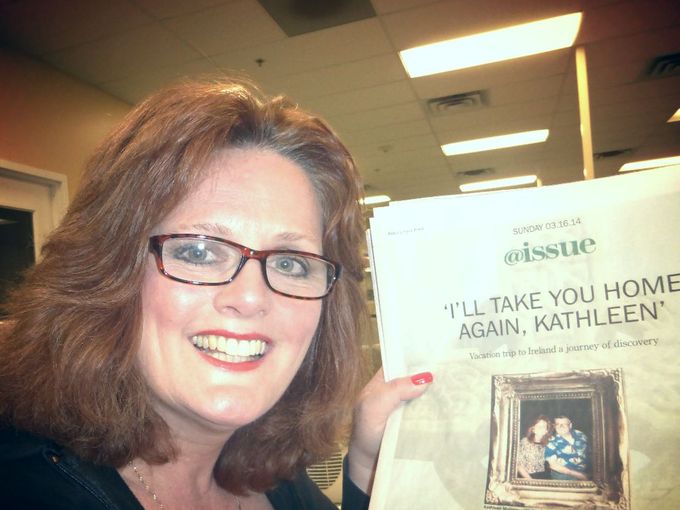
John with his grandmother before his death
Oasis
By Bruce Hanson

John with his grandmother before his death
Oasis
By Bruce Hanson
Bipolar disorder results in 9.2 years reduction in expected life span, and as many as one in five patients with bipolar disorder completes suicide. (National Institute of Mental Health)

Mary Giliberti, the executive director of the National Alliance on Mental Illness, has written a blog in response to critics who have complained recently that NAMI has not done enough to support passage of Pennsylvania Republican Rep. Tim Murphy’s controversial Helping Families In Mental Health Crisis Act.
People on both sides of the issues have criticized NAMI for either supporting Representative Murphy’s bill or not being supportive enough. Although criticism can be constructive, some has been based on incomplete information. Some have failed to appreciate the harm that can come from infighting in any community and the need to find common ground and real solutions that can be enacted into law.
Here is a copy of Director Giliberti’s post.

August 4th, 2014
A blog that I published recently entitled How Bipolar Disorder Destroyed Joe’s Life attracted more than 20,000 readers, making it one of my most popular. That’s a testament to the power of stories told from the heart. It’s author, Kathy Maloney, was profiled in a subsequent story.
The Story Behind the Story
By Shannon Mullen, Reporter Asubry Park Press, July 7, 2014
They say redheads shouldn’t wear pink, but Kathy Maloney has never been the type to let the theys of this world tell her what she can and cannot do. That explains why, late one Saturday afternoon in 1980, an 18-year-old Maloney ducked into the Simco shoe store in downtown West New York, determined to buy the hot pink boots that had caught her eye earlier in the day.
Her timing was terrible. She heard the door lock behind her, felt a gun at her back, and quickly deduced she’d just stumbled into an armed robbery.
Two well-dressed men led her to a back room and forced her to sit on the floor with a handful of other terrified customers and employees. Eventually, the robbers fled with a haul of cash and valuables.
Posted July 30, 2014
Representative Tim Murphy (R-Pa.) is continuing to push for passage of his Helping Families in Mental Health Crisis Act (H.R. 3717) even as the clock to the August 1st congressional recess counts down. Meanwhile the bill’s supporters continue to ask why the National Alliance on Mental Illness has not urged its thousands of members to lobby for its passage.
On the House floor Tuesday (July 29th), Murphy described barriers that are keeping individuals with mental illnesses from getting meaningful care. As a result, some 365,000 of them are in jails and prisons. Today (July 30th), Murphy will co-host a congressional briefing where he will call for reforms in the IMD exclusion — a tool which the federal government uses to prevent states and private mental health care providers from operating facilities with more than 16 beds. The federal government adopted the IMD rule in 1965 as part of its deinstitutionalization campaign. Its refusal to allow Medicaid dollars to be spent on patients in large hospitals is one reason why states began closing down those facilities.
At the briefing today, Murphy and Rep. Eddie Bernice Johnson, (D-Tx.), a cosponsor of H.R. 3717, will explain how the IMD rule is unintentionally contributing to homelessness. I saw this first hand in Miami when a successful housing program called Passageways was forced to vacate 16 beds in its 32 bed housing unit because of the IMD rule. The program’s founders were hard pressed to find suitable housing for those 16 clients who had been living in clean, comfortable and safe rooms. Having half of the program’s clients booted out of their rooms also had a financial impact on the program. This incident was a perfect example of why the National Alliance on Mental Illness, the nation’s largest grassroots mental health agency, has been calling for reform of the IMD rule.
Pennsylvania Republican Tim Murphy urged his fellow House members on Thursday morning to support and pass H.R. 3717, the Helping Families in Mental Health Crisis Act, before August 1st, when Congress goes on recess. Although more than one-third of House members have agreed to co-sponsor the bill, it remains stuck in the House Energy and Commerce Committee. That committee’s chairman, Rep. Fred Upton (R-Mich.) reportedly has said he will not release the bill to the House floor for a vote unless a consensus is reached between Murphy and Democrats who introduced their own bill to stop Murphy’s.
In his five minute speech, Murphy said that fifty percent of persons with schizophrenia suffer from a neurological impairment that makes them incapable of understanding they are ill.
We deny people the right to treatment. We deny them the right to get better. How cruel is that?…The federal government sits oblivious to the problem, and in some cases, actually creates barriers to treatment for those who need help the most…We tell families that federal laws prohibit you from knowing why your loved one is in a mental health crisis, and doctors tell the family your son is only a little dangerous right now, but please bring them back when they become truly violent and then they can be treated. How absurd. Can you imagine if we told someone with diabetes, your blood sugar is too low but we are going to wait until you are in diabetic shock before we give you insulin? The doctor would be fired, the hospital would be sued, and we would ensure that it never happens again. Yet, for families in a mental health crisis, this scenario plays out every single day and not a word is spoken about it.
Murphy delivered his speech a few days after opponents of H.R. 3717, issued an ACTION ALERT urging persons diagnosed with mental disorders to lobby against Murphy’s bill. The National Coalition for Mental Health Recovery described Murphy’s legislation as “shockingly regressive” and warned that its passage would “reverse some of the most significant advances of the last 30 years in mental health services and supports.” The group said it was urging its supporters to contact their representatives between July 21 to August 1.
If any of your Representatives are co-sponsoring, you should respectfully request that they remove their co-sponsorship.
I’ve written before about the hearings that Murphy’s subcommittee held before he drafted his bill. I testified at one public forum in favor of adopting a “need for treatment standard” rather than using “dangerousness” as a criteria for involuntary commitment.
While my call for a more realistic standard puts me at odds with the bills’ opponents, it is only one — and arguably not the main issue — they oppose.
"Pete Earley is a fair-minded reporter who apparently decided that his own feelings were irrelevant to the story. There is a purity to this kind of journalism..."
- Washington Post"A former reporter, Mr. Earley writes with authenticity and style — a wonderful blend of fact and fiction in the best tradition of journalists-turned-novelists."
- Nelson DeMille, bestselling author"A terrific eye for action and character. Earley sure knows how to tell a story. Gripping and intelligent."
- Douglas Preston, bestselling co-author of The Relic

Pete Earley is the bestselling author of such books as The Hot House and Crazy. When he is not spending time with his family, he tours the globe advocating for mental health reform.
As a former reporter for The Washington Post, Pete uses his journalistic background to take a fair-minded approach to the story all while weaving an interesting tale for the reader.
Sign up to receive blog posts and the latest from Pete including new books and resources.
Copyright © 2024 · Education Child Theme on Genesis Framework · WordPress · Log in